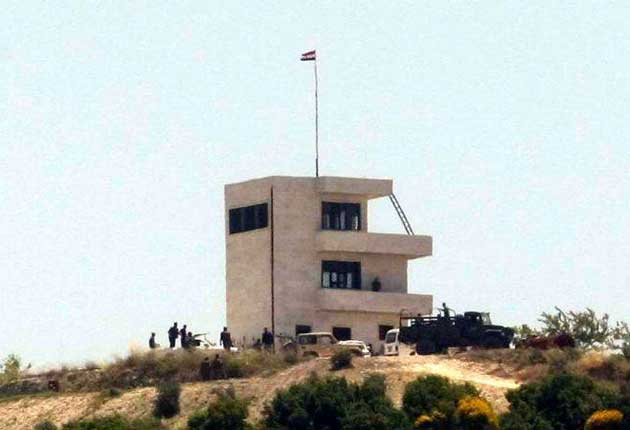More flee as Syrian troops move closer to Turkish border
At least 11,000 people are now being sheltered in refugee camps after escaping from the Syrian army

Your support helps us to tell the story
From reproductive rights to climate change to Big Tech, The Independent is on the ground when the story is developing. Whether it's investigating the financials of Elon Musk's pro-Trump PAC or producing our latest documentary, 'The A Word', which shines a light on the American women fighting for reproductive rights, we know how important it is to parse out the facts from the messaging.
At such a critical moment in US history, we need reporters on the ground. Your donation allows us to keep sending journalists to speak to both sides of the story.
The Independent is trusted by Americans across the entire political spectrum. And unlike many other quality news outlets, we choose not to lock Americans out of our reporting and analysis with paywalls. We believe quality journalism should be available to everyone, paid for by those who can afford it.
Your support makes all the difference.Tensions in northern Syria increased yesterday as President Bashar al-Assad's forces came to within a few hundred feet of Turkish troops protecting refugees along the border.
As the Syrian military crept closer to its northern neighbour than at any time since the start of the uprising, hundreds more civilians fled their homes and escaped into Turkey.
Witnesses on the Turkish side reported seeing Syrian troops and tanks surrounding the border village of Khirbet al-Jouz, less than a mile away. "I had to escape from the village because I was in fear of my life," an activist who has been crossing back and forth over the border said. "There is a camp near Khirbet al-Jouz for refugees, but the army has surrounded it. I can see them now."
The Local Co-ordinating Committees, which have been tracking the Syrian uprising since it began in mid-March, said that civilians had reported seeing tanks and snipers positioned on rooftops in the village.
The development came as the EU decided to target the Baathist government with a new round of sanctions. On the 100th day of the Syrian uprising, Brussels said the move was in response to the "gravity of the situation" inside Syria.
Elsewhere, there were reports that the Syrian military was continuing to fan out across the country's northern region – an operation that began earlier this month after Syrian state television reported that 120 members of its security services had been killed by armed groups. Subsequent accounts have suggested that mutinous police officers and troops could have been responsible for the violence.
Witnesses said that hundreds of refugees fled across the border after troops swept into the village of Managh, north of Syria's second city Aleppo and about 10 miles from Turkey.
"I was contacted by relatives from Managh," said one villager who spoke to Reuters news agency. "Armoured personnel carriers are firing their machine guns randomly and people are fleeing the village."
According to a Turkish Red Crescent official, about 600 men, women and children fled their homes yesterday. "They are running in panic. They have seen what happened to their villages," said one refugee. At least 11,000 people are now being sheltered in Turkish refugee camps after escaping from the advancing Syrian army. The northern city of Aleppo, which is the commercial hub of Syria, has so far not witnessed any serious upheaval. But this week roadblocks around the city were increased and a number of students at the university were arrested after a protest.
Wissam Tarif, executive director of Syrian human rights organisation Insan, said it was only a matter of time before the city's majority Sunni population – who have traditionally maintained a commercial alliance with the President's ruling Alawite sect – rose up in anger.
"Now the economy is not working, the people of Aleppo are thinking about what comes next," he said.
There were also reports that the security services had arrested students at Damascus University on Wednesday. According to a Facebook page monitoring the uprising, students were attacked in their rooms by secret policemen and "thugs" with knives and batons.
In response to criticisms from the EU, Foreign Minister Walid Moallem has accused the West of being a guiding hand behind the nationwide uprising. Yesterday he said his government would "forget that Europe is on the map".
Human rights groups say around 1,400 civilians have been killed since demonstrations began in March.
Join our commenting forum
Join thought-provoking conversations, follow other Independent readers and see their replies
Comments